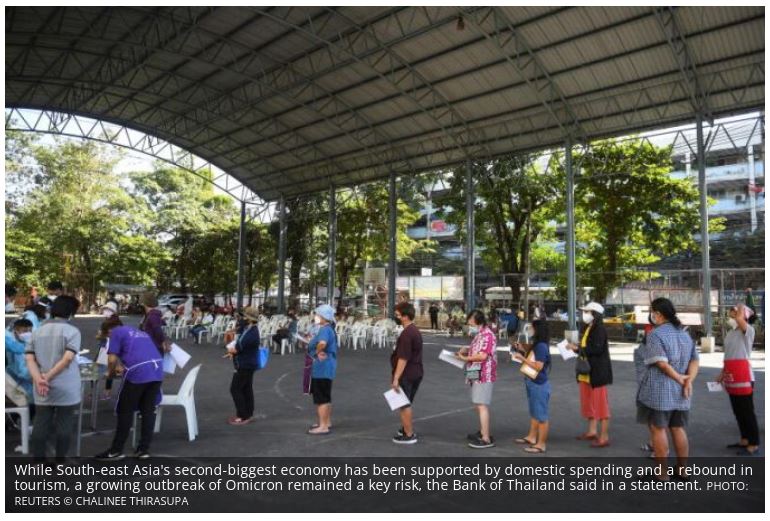Thai central bank sees lower H1 economic growth due to Omicron outbreak
[BANGKOK] Thailand’s central bank said on Monday (Jan 10) the country’s economy could see lower growth in the first half of 2022 than a baseline scenario due to uncertainties caused by the Omicron variant of the coronavirus.
While South-east Asia’s second-biggest economy has been supported by domestic spending and a rebound in tourism, a growing outbreak of Omicron remained a key risk, the Bank of Thailand said in a statement.
Thailand is expected to bring the Omicron outbreak under control within the first quarter of 2022, it said.
“There are great downside risks in the first half of 2022 because of the Omicron outbreak, which could be more severe and longer than expected,” Sakkapop Panyanukul, a senior director at the Bank of Thailand, told a meeting with analysts.
Thailand’s economy is forecast to expand by 3.4 per cent in 2022, the central bank said last week.
Financial stability for households and businesses remained fragile, reflected by high levels of household and corporate debt, central bank data showed.
Non-performing loans were seen increasing slightly, Sakkapop said, adding that the bank will roll out targeted measures in this area.
Inflation is also seen increasing temporarily in the first half of 2022, but would still be within target, Piti Disyatat, an assistant governor at the central bank, told the meeting.
“If inflation needs to be managed, increasing interest rates will be our main tool,” Piti said.
The Bank of Thailand is also ready to intervene in markets if the baht currency became too volatile, he said.
The baht hit 33.14 against the US dollar on Jan 5, the highest since late November, though eased to 33.67 on Monday.
The central bank’s monetary policy committee last month kept the benchmark interest rate at a record low of 0.5 per cent for a 13th consecutive meeting to support the economic recovery.
Going forward, the committee will only meet 6 times a year, or every 7 to 10 weeks, down from 8 times or every 6 to 8 weeks previously.
“Meeting frequently creates unnecessary burden for the financial market to anticipate what is coming,” said Piti.
The committee is due to meet for the first time this year on Feb 9.
REUTERS


 English
English




